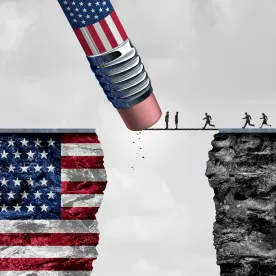As a result of a January U.S. Supreme Court 5-4 vote to remove a nationwide injunction blocking the enhanced Public Charge Rule, beginning on Feb. 24, USCIS will implement its Inadmissibility on Public Charge Grounds Final Rule. The new rule aims to make it easier for the government to deny legal permanent residency to immigrants “likely to use public benefits” and will become effective nationwide, except in Illinois where the rule remains enjoined by a federal court.
The new Public Charge Rule is not retroactive and will apply only to applications filed after the effective date. Applications and petitions already pending with USCIS on Feb. 24, or postmarked prior to that date, will not be subject to the updated public charge rule.
History
Congress first established the Public Charge Rule in 1882 to allow the U.S. government to deny a U.S. visa to anyone who is likely, at any time, to become a public charge. Under Section 212(a)(4) of the Immigration and Nationality Act (INA), an individual seeking admission to the United States or seeking to adjust status to that of an individual lawfully admitted for permanent residence (green card) is inadmissible if the individual “at the time of application for admission or adjustment of status, is likely at any time to become a public charge.”
Benefits Impacted and Exempted by the New Public Charge Rule
By means of quick overview, here are the benefits subject to the new rule:
-
Supplemental Security Income (SSI)
-
Temporary Assistance for Needy Family (TANF)
-
Any other federal, state or local cash benefit programs
-
Section 8 Housing Assistance under the Housing Choice Voucher Program
-
Section 8 Project-Based Rental Assistance (including Moderate Rehabilitation)
-
Medicaid and other public assistance used to support aliens who reside in an institution for long-term care such as a nursing home or mental health institution
In addition, here are the benefit exemptions that will not be considered for public charge purposes:
-
Children’s Health Insurance Program (CHIP)
-
Emergency disaster relief
-
Job training programs
-
Benefits received by individuals under age 21, including educational assistance and nutrition programs
-
Benefits received by pregnant women, including the Special Supplemental Nutrition Program for Women
-
Foster care and adoption assistance
-
Cash payments that have been earned, such as Title II Social Security benefits, government pensions, and veterans’ benefits, and other forms of earned benefits
-
Unemployment compensation
Impacts of the New Rule on Adjustment of Status Applicants
All applicants for adjustment of status, again – except those residing in Illinois, will be subject to the new rule. In determining inadmissibility, USCIS defines “public charge” as an individual who is likely to become “primarily dependent for subsistence, as demonstrated by either the receipt of public cash assistance for income maintenance or institutionalization for long-term care at government expense.”
USCIS will use a totality of the alien’s circumstances standard in determining whether immigrant or nonimmigrant visa applicants, applicants for admission to the United States, and applicants for adjustment of status to lawful permanent residence are likely to become a public charge “at any time” in the future. The alien’s circumstances will be measured by seven factors, including:
-
Age
-
Health
-
Family status
-
Assets, resources and financial status
-
Education and skills
-
Prospective immigration status and period of admission
-
Affidavit of support, filed under 213 of the INA
No single factor, other than the lack of an affidavit of support (if required) will determine whether an individual is a public change.
Starting on Feb. 24, adjustment of status applicants will need to attach an additional new Form I-944, Declaration of Self-Sufficiency, when applying for a green card, which will request information on personal and household assets, credit score report, resources, financial status, bankruptcy history, and public benefits history. In addition, applicants and petitioners must also use the new editions of Forms I-129, I-129CW, I-485 (and I-485 Supplement A), I-485J, I-539, I-539A, I-601, I-864, I-864A, I-864EZ, and I-912.
Individuals applying for green cards and visas from outside the United States, via consular processing, will not be affected by the new rule.
Exceptions for those in Illinois
Applicants for adjustment of status who live in Illinois and who are subject to the public charge ground of inadmissibility are not subject to the final rule. Applicants and petitioners seeking to extend an alien’s nonimmigrant stay or change an alien’s nonimmigrant status in Illinois are also not subject to the final rule.
USCIS mandates that applicants and petitioners covered by the Illinois injunction continue to use the prior version of Forms I-485 and I-129. These applicants do not need to complete the new Form I-944.
Impacts on Those Seeking Change or Extension of Nonimmigrant Status and Others
The enhanced rule will also apply to those seeking a change or extension of nonimmigrant status. Though this is where an exception applies as the public charge standard applied to nonimmigrant visas will be retrospective, meaning that USCIS will examine only whether the applicant received 12 months or more of public benefits during any 36-month period while in the nonimmigrant status he or she wishes to change or extend. Nonimmigrant applicants will not be required to file the new form I-944 with their petitions to either change or extend their status.
Finally, the final Public Charge Rule will also not apply to refugees, asylum applicants, survivors of trafficking, survivors of domestic violence (T or U Visas), VAWA self-petitioners, or special immigrant juveniles applying for status or permanent residency.







 />i
/>i

